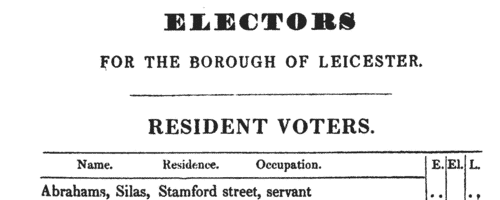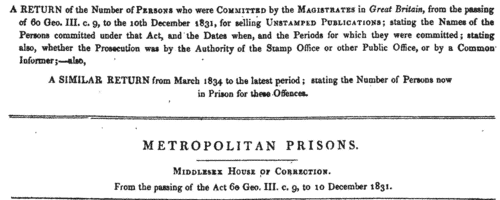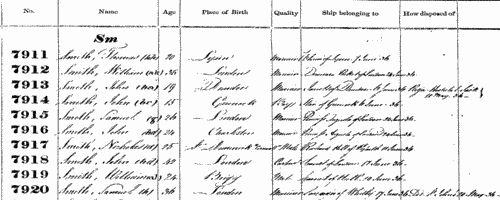Linney Surname Ancestry ResultsOur indexes 1000-1999 include entries for the spelling 'linney'. In the period you have requested, we have the following 185 records (displaying 91 to 100): Single Surname Subscription | | | Buying all 185 results of this search individually would cost £1,096.00. But you can have free access to all 185 records for a year, to view, to save and print, for £100. Save £996.00. More... |
These sample scans are from the original record. You will get scans of the full pages or articles where the surname you searched for has been found. Your web browser may prevent the sample windows from opening; in this case please change your browser settings to allow pop-up windows from this site. Dissolutions of Partnerships
(1829)
Trade partnerships dissolved, or the removal of one partner from a partnership of several traders
LINNEY. Cost: £6.00.  | Sample scan, click to enlarge

| Cambridgeshire Voters: Thorney Abbey
(1832)
The poll on the election of three knights of the shire to serve in Parliament for the county of Cambridge, was taken at Cambridge, Royston, Newmarket, Ely, Wisbech and Whittlesea 18 and 19 December 1832. The candidates were Henry John Adeane esquire, Richard Greaves Townley esquire, Charles Philip Yorke esquire and John Walbanke Childers esquire. This poll book sets out the names of the voters in alphabetical order hundred by hundred and parish by parish. The voters' full names are stated, surname first. The right hand column records their votes. The new qualification for suffrage in the counties, after the passage of the 1832 Great Reform Bill, was the possession of a freehold estate worth 40s a year or more, a copyhold or long leasehold of £10 a year or more, or a tenancy or short leasehold of £50 a year or more.
LINNEY. Cost: £6.00.  | Sample scan, click to enlarge

| Cambridgeshire Voters: Wisbech
(1832)
The poll on the election of three knights of the shire to serve in Parliament for the county of Cambridge, was taken at Cambridge, Royston, Newmarket, Ely, Wisbech and Whittlesea 18 and 19 December 1832. The candidates were Henry John Adeane esquire, Richard Greaves Townley esquire, Charles Philip Yorke esquire and John Walbanke Childers esquire. This poll book sets out the names of the voters in alphabetical order hundred by hundred and parish by parish. The voters' full names are stated, surname first. The right hand column records their votes. The new qualification for suffrage in the counties, after the passage of the 1832 Great Reform Bill, was the possession of a freehold estate worth 40s a year or more, a copyhold or long leasehold of £10 a year or more, or a tenancy or short leasehold of £50 a year or more.
LINNEY. Cost: £6.00.  | Sample scan, click to enlarge

| Leicester Poll Book: Resident Voters
(1832)
A poll was taken on 12 and 13 December 1832 for the election of two representatives in Parliament for the borough of Leicester, the candidates being William Evans esquire (E.), Wynn Ellis esquire (El.) and J. W. Boughton Leigh esquire (L.). This poll book, printed by J. G. Brown of Leicester, gives the name, residence and occupation of all the electors, divided into four categories: resident voters, non-resident voters, resident non-voters, and non-resident non-voters. For those who polled, their votes are marked on the right hand side. Under the 1832 Reform Act the franchise within the borough had been extended to all (adult male) owners or tenants of property worth £10 a year or more.LINNEY. Cost: £4.00.  | Sample scan, click to enlarge

| Voters under the £10 franchise in Ripon
(1832)
A poll for two burgesses to serve in parliament for the borough of Ripon was taken on 11 December 1832, the candidates being sir Charles James Dalbiac (D.), Thomas Kitchingman Staveley esquire (S.), William Markham esquire (M.) and Joshua Samuel Crompton esquire (C.). This poll book lists all voters alphabetically in three sections - voters under the £10 franchise (copyholders and long-leaseholders of property of up to £10 per annum); voters resident in Bondgate; and voters under the burgage franchise. There is also a list of unregistered voters who tendered votes, and a list of neutral voters.LINNEY. Cost: £4.00.  | Sample scan, click to enlarge

| Gaoled Newspaper Vendors in Kirkdale House of Correction
(1822-1833)
The 1815 Stamp Act increased the tax on newspapers to fourpence a copy. Many radical newspaper publishers and the booksellers and newsagents who sold their popular papers ignored the law, and were liable to suffer prosecution either by authority of the Stamp Office which regulated the tax or by a common informer. In 1836 the House of Commons ordered these returns to be made from each prison, giving details of the convictions that had been made under the Act. The returns are not entirely consistent from one gaol to another, but most give names, dates, and period of imprisonment.LINNEY. Cost: £6.00.  | Sample scan, click to enlarge

| Dissolutions of Partnerships
(1835)
Trade partnerships dissolved, or the removal of one partner from a partnership of several traders
LINNEY. Cost: £6.00.  | Sample scan, click to enlarge

| Unclaimed Dividends
(1835)
Names of creditors yet to claim dividends from bankrupts' estatesLINNEY. Cost: £6.00.  | Sample scan, click to enlarge

|  British merchant seamen
(1835-1836) British merchant seamen
(1835-1836)
At this period, the foreign trade of ships plying to and from the British isles involved about 150,000 men on 15,000 ships; and the coasting trade about a quarter as many more. A large proportion of the seamen on these ships were British subjects, and so liable to be pressed for service in the Royal Navy; but there was no general register by which to identify them, so in 1835 parliament passed a Merchant Seamen's Registration Bill. Under this act this large register of British seamen was compiled, based on ships' crew lists gathered in British and Irish ports, and passed up to the registry in London. Each seaman was assigned a number, and the names were arranged in the register by first two letters of the surname (our sample scan shows one of the pages for 'Sm'); in addition, an attempt was made to separate out namesakes by giving the first instance of a name (a), the second (b), and so on. But no effective method was devised to prevent the same man being registered twice as he appeared in a second crew list; moreover, the original crew lists were clearly difficult for the registry clerks to copy, and some of the surname spellings appear to be corrupted. A parliamentary committee decided that the system devised did not answer the original problem, and this register was abandoned after less than two years: but it is an apparently comprehensive source for British merchant seamen in 1835 to 1836. The register records the number assigned to each man; his name; age; birthplace; quality (master, captain, mate, 2nd mate, mariner, seaman, fisherman, cook, carpenter, boy &c.); and the name and home port of his ship, with the date of the crew list (usually at the end of a voyage). Most of the men recorded were born in the British Isles, but not all (for instance, Charleston and Stockholm appear in the sample scan). The final column 'How disposed of' is rarely used, and indicates those instances where a man died, was discharged, or deserted his ship during the voyage.LINNEY. Cost: £8.00.  | Sample scan, click to enlarge

| Bankrupts
(1836)
Bankruptcy notices for England and Wales: bankruptcy often caused people to restart their lives elsewhere, so these are an important source for lost links
LINNEY. Cost: £6.00.  | Sample scan, click to enlarge

|
Research your ancestry, family history, genealogy and one-name study by direct access to original records and archives indexed by surname.
|













